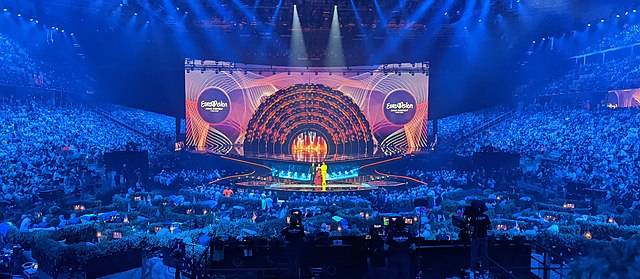Eurovision isn’t political
It’s been just over a month since the 67th edition of the Eurovision Song Contest took place in Liverpool; with Sweden’s Loreen taking the overall crown. The contest came to the UK following Sam Ryder’s second place finish in 2022, with winners Ukraine unable to host. Ryder managed to reignite the UK’s affection for the contest, with Liverpool buzzed for the occasion, but with this year’s UK entrant, Mae Muller, finishing towards the bottom of the table, it could be said that it’s back to old habits for the UK, with a notion that Europe’s dislike for us is to blame for our poor results. However, to simply boil down this diverse and colourful contest to politics trivialises something that is so loved by so many.
When discussing Eurovision, commonly the phrases ‘block voting’ and ‘diaspora’ won’t be far behind. Greece will give their 12 points to Cyprus, the Scandinavian countries will vote for each other; countries will support their neighbours. I’m not here to statistically dispute those claims. Some years it will happen, but some years it won’t. Removing the political nature of Eurovision is not about over-analysing the results and finding objective proof that it is not political. Instead, it is about truly celebrating the nature of the contest, and why it is such an important date in the calendar.
Eurovision gives a platform to music that may otherwise struggle to find its place within the mainstream
Eurovision has always been a celebration of the vast expanse of culture Europe has to offer, a showcase of the musical diversity on the continent. From native languages to traditional instruments, there is always something for everyone. Eurovision gives a platform to music that may otherwise struggle to find its place within the mainstream, and consequently gives these artists a pathway to success. You only have to look at KEiiNO (Norway’s 2019 entry) combining dance-pop with joiking – a traditional form of song in Sami culture. Their entry finished in sixth place but gained the highest public vote and they now have a successful career touring Europe.
Despite this message of celebration, it can appear impossible to separate politics from the contest. There are rules in place that state that songs or performers cannot promote or refer to anything political, in order to maintain the neutrality of the contest, with Belarus being removed from the contest in 2021 for failing to follow this rule. Similarly, following the invasion of Ukraine, Russia were removed from the 2022 contest and cut their connections with the European Broadcasting Union, preventing them from future participation. On the surface this conscious effort to maintain a non-political stance evokes a feeling of political intervention, presenting a clear link between the contest and politics. However, this clear exercise of democracy allows the contest to remove itself from political statement and focus on what is most important, the music.
Difference is celebrated, love is shared, and politics is forgotten
Despite this constant effort to remove political statement from the contest, societal attitudes cannot help but infiltrate the results. This turns the attention towards Ukraine’s victory in 2022, which was correlated with the devasting consequences of the conflict the country had experienced in the months leading up to the contest. The overwhelming televote result Ukraine received evidenced this. However, as I mentioned in a prior article for The Boar, to simply put this victory down to the actions of Russia is to completely discredit the original purpose of the contest. This support was not a political statement, it was a call of humanity to show the people of Ukraine that Europe was with them. It was a showcase of human empathy, and acted as reassurance that the actions of the few did not reflect the attitudes of the majority.
I have never watched Eurovision with politics in mind; it has never impacted my voting or opinions. I can’t say that is true of everyone. However, coming to the contest believing the results or entrants to be politically motivated blinds you from the true beauty present. A whole continent, in fact further than a whole continent, for one night is completed united by music. Difference is celebrated, love is shared, and politics is forgotten. That is the true nature of Eurovision.

Comments